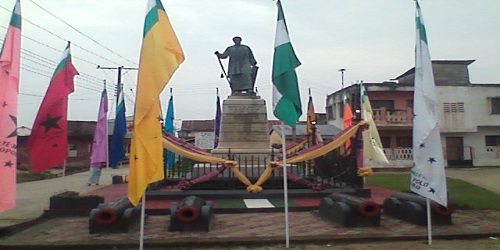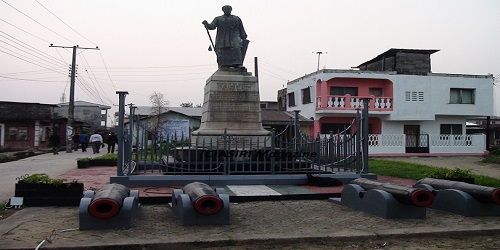
Jaja of Opobo (full name: Jubo Jubogha; 1821–1891) was the first known Nigerian richest man, nationalist, a merchant prince and the founder of Opobo city-state which now forms part of Nigeria`s River State. Jaja whose real name was Mbanaso Okwaraozurumbaa was also a savvy political and military strategist, brought to the Bonny Kingdom as a slave, who was perhaps the most troublesome thorn in the flesh of 19th-century British imperial ambition in southern Nigeria.
Jubo Jubogba, also known as Jo Jo Ubam by the Igbo and as Jaja of Opobo, first, by the Europeans and later by most people, was born about 1821 at Úmuduruõha, Amaigbo village in the Orlu district, now Imo State of Eastern Nigeria (Isichei 1976:98). At birth he was given a native Igbo name Mbanaso Okwaraozurumba and was the third son of his parents, the Okwaraozurumba.
According to different oral sources, Jaja was sold into slavery in the Niger Delta under circumstances which are far from clear. One version of the oral traditions says that he was sold because, as a baby, he cut the upper teeth first, an abominable phenomenon in traditional Igbo society. Another version claims that he was captured and sold by his father's enemy. Regardless, he was bought by Chief Iganipughuma Allison of Bonny, by far the most powerful city-state on the Atlantic coast of Southeastern Nigeria before the rise of Opobo.
By 1891 British political intrigue had resulted in the death of King Jaja in exile. The period between 1891-mid 1893 left Opobo and King Jaja dynasty on trial. But the chiefs of Opobo spectacularly managed Opobo Kingdom until a new successor was named. He was Prince Sunday Jaja. (1893 1915).The Opobo to which Chief Sunday was to rule had not markedly altered in some respects from King Jaja days including the period of his exile. Trade was still transacted in the traditional manner, with the chiefs acting as middlemen between the hinterland suppliers and the European supercargoes.Chief Sundays reign marked remarkable economic and political stability in Opobo.
Despite the strenuous efforts of Consul Johnston and Consul Hewitt the trade on the Imo River was still dominated by Opobo men. In 1893 when Sunday succeeded to the throne, the African Association, which had threatened the position of the Opobo middlemen by pushing into the hinterland markets, finally realized their inability to compete effectively. They quickly reached an agreement with the Opobo chiefs whereby the later purchased their hinterland trading posts for 500 puncheons of oil (about £7000) and promised to remain on the coast as in the port. It was in this year (1893) that Chief Cookey Gam was appointed as a political agent for opobo (Prince Archibong, Political Agent, for Calabar) and the buying of all the establishments of the African Association (the "Amalgamates") at Akwete, Ohambele, and Essene market by Both Bonny and Opobo.

The administration of Opobo Town politically and judiciary, was by a British Council, Civil and criminal offences were reported to, and investigated by him, town and home matters, including petty squabble between individuals were referred to him. The council exercised the power of imposing fine and or sentencing to terms of imprisonment. An appeal against a judgment of the consul was lodged with the consul general who on review at Calabar either confirmed, amended, or annulled the judgment.
In August, 1894 King Sunday Jaja as king of Opobo together with his chiefs granted the existing site to the Niger delta pastorate church the site on which the St. Paul church and other building now stand. The religious festivals for the ancestors were still performed regularly; the owuogbo cult still retained its hold both as an important acculturative instrument and as a vital arm of government. Although Christianity had gained a foot hold, the adherents remained few and inconsequential.




